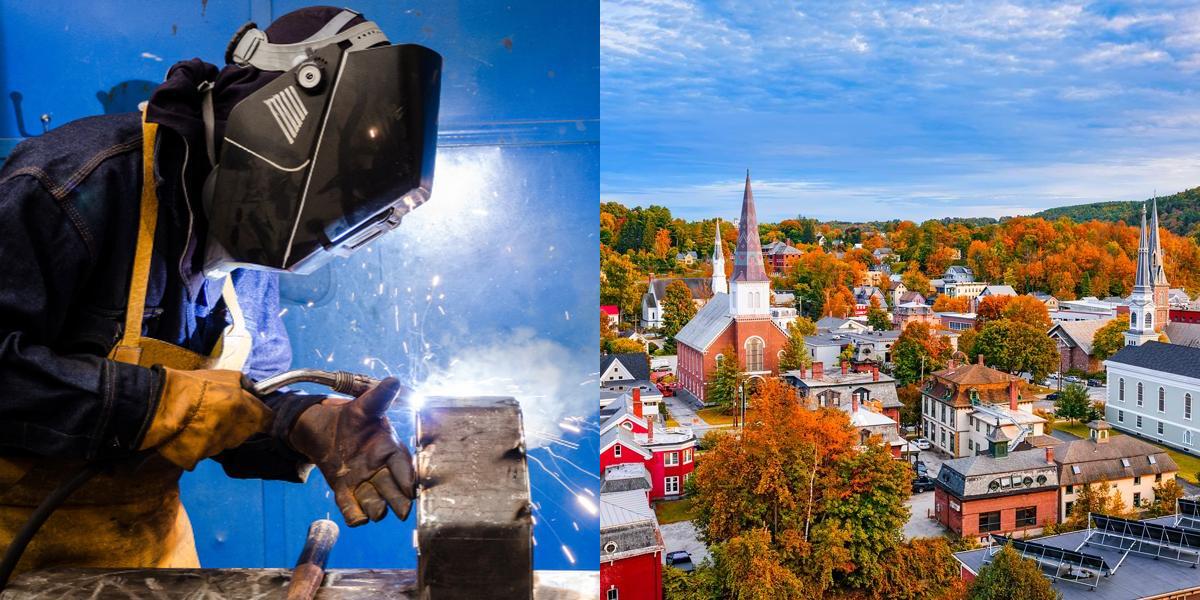How to Become a Welder in Vermont

What is a Welder?
A welder is a skilled tradesperson who is responsible for joining together metal pieces or parts. They use various welding techniques, such as gas metal arc welding (GMAW), shielded metal arc welding (SMAW), and tungsten inert gas (TIG) welding, to create strong and durable metal structures. Welders often work with blueprints, sketches, or specifications to ensure the accuracy of their work.
Some of the responsibilities of a welder include:
- Reading and interpreting technical drawings and blueprints.
- Operating welding equipment and tools.
- Preparing metal surfaces for welding.
- Welding metal components together based on specific requirements.
- Inspecting welded structures for quality and precision.
- Performing maintenance and repairs on welding equipment.
Step 3: Apply for welding jobs
Start searching for welding jobs in your area and apply to those that align with your skills and career goals. Look for job postings on online job boards, company websites, and local classifieds. Tailor your application materials, including your resume and cover letter, to each job you apply for. Emphasize your relevant skills and certifications, and explain why you would be a good fit for the position.
Step 4: Prepare for interviews
If your application is successful, you may be invited for an interview. Prepare for the interview by researching the company and familiarizing yourself with their products or services. Practice common interview questions and be prepared to discuss your welding experience, skills, and certifications. Highlight any notable projects or achievements that demonstrate your expertise in the field.
Step 5: Gain practical experience
While certification is important, practical experience can also play a significant role in landing a welding job. Consider seeking out apprenticeship or internship opportunities to gain hands-on experience and further develop your skills. This can help make you more competitive in the job market and provide valuable real-world experience that employers value.
Career Paths and Opportunities after Becoming a Welder
Once you have become a certified welder, there are various career paths and opportunities available to you. Welding is a versatile skill that is in demand across many industries. Here are some potential career paths you can explore:
1. Construction and Infrastructure
Welders are essential in the construction and infrastructure industry. They play a crucial role in building and repairing structures such as buildings, bridges, pipelines, and highways. With the right experience and expertise, you can progress to become a welding inspector, supervisor, or project manager.
2. Manufacturing and Fabrication
The manufacturing and fabrication industry relies heavily on welders to join metal components together. From automotive manufacturing to aerospace, there are numerous opportunities to work in this sector. With experience, you can specialize in areas such as pipe welding, sheet metal fabrication, or welding automation.
3. Oil and Gas
The oil and gas industry requires welders for various tasks, including pipeline construction, maintenance, and repair. Welders in this sector may work on offshore platforms, refineries, or pipeline installations. This industry offers attractive compensation packages and opportunities for travel.
4. Shipbuilding and Maritime
Shipbuilding and maritime industries also provide opportunities for welders. From building new ships to repairing and maintaining existing vessels, welders are needed to join metal parts and ensure structural integrity. Jobs in this sector may involve working in shipyards or on offshore installations.
5. Automotive and Motorsports
Welders are crucial in the automotive and motorsports industries for fabricating and repairing metal components. This includes everything from welding car frames and body panels to creating custom parts for race cars. With the right skills, you can work in automotive manufacturing, custom car shops, or motorsports teams.
6. Entrepreneurship
Becoming a certified welder also opens up opportunities for entrepreneurship. With the right skills and equipment, you can start your own welding business. This could involve offering welding services to individuals and businesses in your community or specializing in a specific niche such as artistic welding or custom fabrication.
How much does a Welder make?
The average salary for a welder can vary depending on factors such as experience, location, and industry. According to the U.S. Bureau of Labor Statistics (BLS), the median annual wage for welders, cutters, solderers, and brazers was $43,410 as of May 2020. The lowest 10 percent earned less than $30,860, while the highest 10 percent earned more than $64,240.
Starting salaries for welders can vary greatly. Entry-level welders with little to no experience may start at or near the lower end of the salary range. However, as they gain experience and develop their skills, their earning potential increases.
Final Thoughts
Becoming a certified welder can lead to a rewarding career with numerous opportunities for growth and advancement. By following the steps outlined above, you can obtain your welder certification and increase your chances of finding a job in the field. Whether you choose to work in construction, manufacturing, or any other industry, your welding skills will be in demand. So, take the first step towards your welding career and start your journey to becoming a certified welder today.
Wondering if there's more? Perhaps these other articles will be more helpful if this one isn't exactly what you're after:






